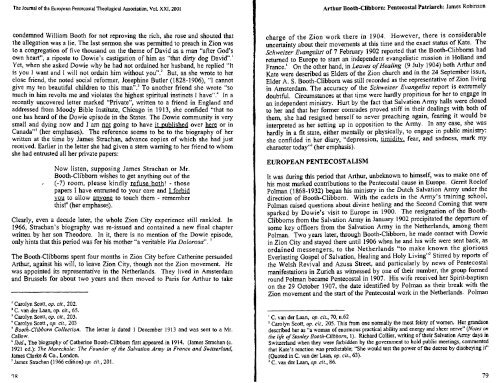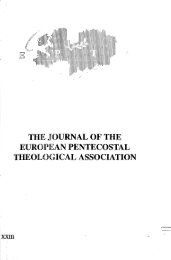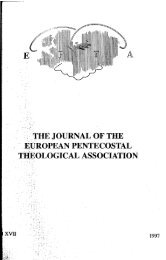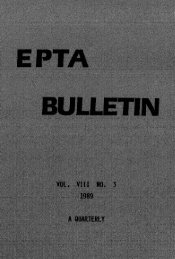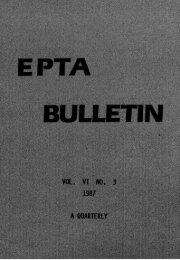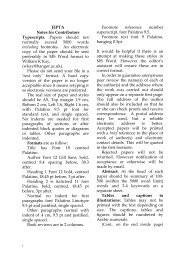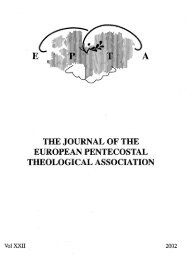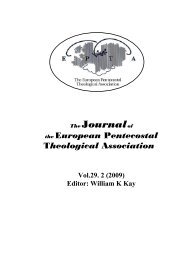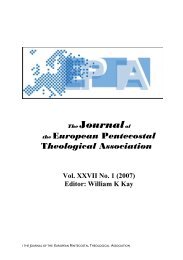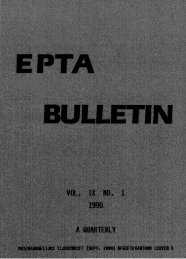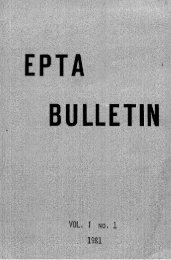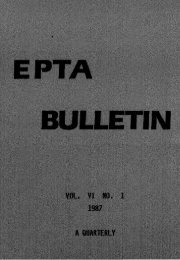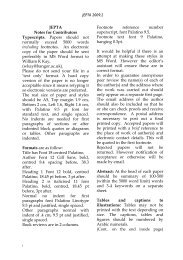jepta 2001 21 - European Pentecostal Theological Association
jepta 2001 21 - European Pentecostal Theological Association
jepta 2001 21 - European Pentecostal Theological Association
Create successful ePaper yourself
Turn your PDF publications into a flip-book with our unique Google optimized e-Paper software.
The Journal of the <strong>European</strong> <strong>Pentecostal</strong> <strong>Theological</strong> <strong>Association</strong>, Vol. XXI, <strong>2001</strong><br />
Arthur Booth-Clibborn: <strong>Pentecostal</strong> Patriarch: James Robinson<br />
condemned William Booth for not reproving the rich, she rose and shouted that<br />
the allegation was a lie. The last sermon she was permitted to preach in Zion was<br />
to a congregation of five thousand on the theme of David as a man "after God's<br />
own heart", a riposte to Dowie's castigation of him as "that dirty dog David".'<br />
Yet, when she asked Dowie why he had not ordained her husband, he replied "It<br />
is you 1 want and I will not ordain him without But, as she wrote to her<br />
close friend, the noted social reformer, Josephine Butler (1828-1906), "1 cannot<br />
give my ten beautiful children to this man".' To another friend she wrote "so<br />
much in him revolts me and violates the highest spiritual instincts I have".4 In a<br />
recently uncovered letter marked "Private", written to a friend in England and<br />
addressed from Moody Bible Institute, Chicago in 1913, she confided "that no<br />
one has heard of the Dowie episode in the States. The Dowie community is very<br />
small and dying now and I am going to have jt published over M or in<br />
Canada"' (her emphases). The reference seems to be to the biography of her<br />
written at the time by James Strachan, advance copies of which she had just<br />
received. Earlier in the letter she had given a stem warning to her friend to whom<br />
she had entrusted all her private papers:<br />
Now listen, supposing James Strachan or Mr.<br />
Booth-Clibborn wishes to get anything out of the<br />
, (-) room, please kindly refuse both! - those<br />
papers I have entrusted to your care and I forbid<br />
vou to allow anvone to touch them - remember<br />
this!' (her emphases).<br />
Clearly, even a decade later, the whole Zion City experience still rankled. In<br />
1966, Strachan's biography was re-issued and contained a new final chapter<br />
written by her son Theodore. In it, there is no mention of the Dowie episode,<br />
only hints that this period was for his mother "a veritable Via Dolorosa". '<br />
The Booth-Clibborns spent four months in Zion City before Catherine persuaded<br />
Arthur, against his will, to leave Zion City, though not the Zion movement. He<br />
was appointed its representative in the Netherlands. They lived in Amsterdam<br />
and Brussels for about two years and then moved to Paris for Arthur to take<br />
' Carolyn Scott, op. cic, 202.<br />
C. van der Laan, op. cit., 65.<br />
' Carolyn Scon, op. cit., 203.<br />
' Carolyn Scott , op. cit., 203<br />
900th-Clibborn Collection. The letter is dated 1 December 1913 and was sent to a Mr.<br />
Callow.<br />
Ibid., The biography of Catherine Booth-Clibborn first appeared in 1914. (James Strachan (c.<br />
19<strong>21</strong> ed.): The Marechale: The Founder of the Salvation Army in France and Switzerland,<br />
James Clarke & Co., London.<br />
James Strachan (1966 edition) op. cit., 201.<br />
charge of the Zion work there in 1904. However, there is considerable<br />
uncertainty about their movements at this time and the exact status of Kate. The<br />
Schweizer Evangelist of 7 February 1902 reported that the Booth-Clibborns had<br />
returned to Europe to start an independent evangelistic mission in Holland and<br />
France.' On the other hand, in Leaves of Healing (9 July 1904) both Arthur and<br />
Kate were described as Elders of the Zion church and in the 24 September issue,<br />
Elder A. S. Booth-Clibborn was still recorded as the representative of Zion living<br />
in Amsterdam. The accuracy of the Schweizer Evangelist report is extremely<br />
doubtful. Circumstances at that time were hardly propitious for her to engage in<br />
an independent ministry. Hurt by the fact that Salvation Army halls were closed<br />
to her and that her former comrades proved stiff in their dealings with both of<br />
them, she had resigned herself to never preaching again, fearing it would be<br />
interpreted as her setting up in opposition to the Army. In any case, she was<br />
hardly in a fit state, either mentally or physically, to engage in public ministry:<br />
she confided in her diary, "depression, timidity, fear, and sadness, mark my<br />
character today"' (her emphasis).<br />
EUROPEAN PENTECOSTALISM<br />
It was during this period that Arthur, unbeknown to himself, was to make one of<br />
his most marked contributions to the <strong>Pentecostal</strong> cause in Europe. Gemt Roelof<br />
Polman (1868-1932) began his ministry in the Dutch Salvation Army under the<br />
direction of Booth-Clibborn. With the cadets in the Army's training school,<br />
Polman raised questions about divine healing and the Second Coming that were<br />
sparked by Dowie's visit to Europe in 1900. The resignation of the Booth-<br />
Clibborns from the Salvation Army in January 1902 precipitated the departure of<br />
some key officers from the Salvation Army in the Netherlands, among them<br />
Polman. Two years later, through Booth-Clibborn, he made contact with Dowie<br />
in Zion City and stayed there until 1906 when he and his wife were sent back, as<br />
ordained messengers, to the Netherlands "to make known the glorious<br />
Everlasting Gospel of Salvation, Healing and Holy Living"' Stirred by reports of<br />
the Welsh Revival and Azusa Street, and particularly by news of <strong>Pentecostal</strong><br />
manifestations in Zurich as witnessed by one of their number, the group formed<br />
round Polman became <strong>Pentecostal</strong> in 1907. His wife received her Spirit-baptism<br />
on the 29 October 1907, the date identified by Polman as their break with the<br />
Zion movement and the start of the <strong>Pentecostal</strong> work in the Netherlands. Polman<br />
' C. van der Laan, op. cit., 70,n.62<br />
Carolyn Scon, op. cit., 205. This from one normally the most feisty of women. Her grandson<br />
described her as "a woman of enormous practical ability and energy and sheer nerve" (Notes on<br />
the life of Stanley Booth-Clibborn, 1). Richard Collier, writing of their Salvation Army days in<br />
Switzerland when they were forbidden by the government to hold public meetings, commented<br />
that Kate's reaction was predictable; "She would test the power of the decree by disobeying it"<br />
(Quoted in C. van der Laan, op. cit., 63).<br />
' C. van der Laan, op, cit., 86.


